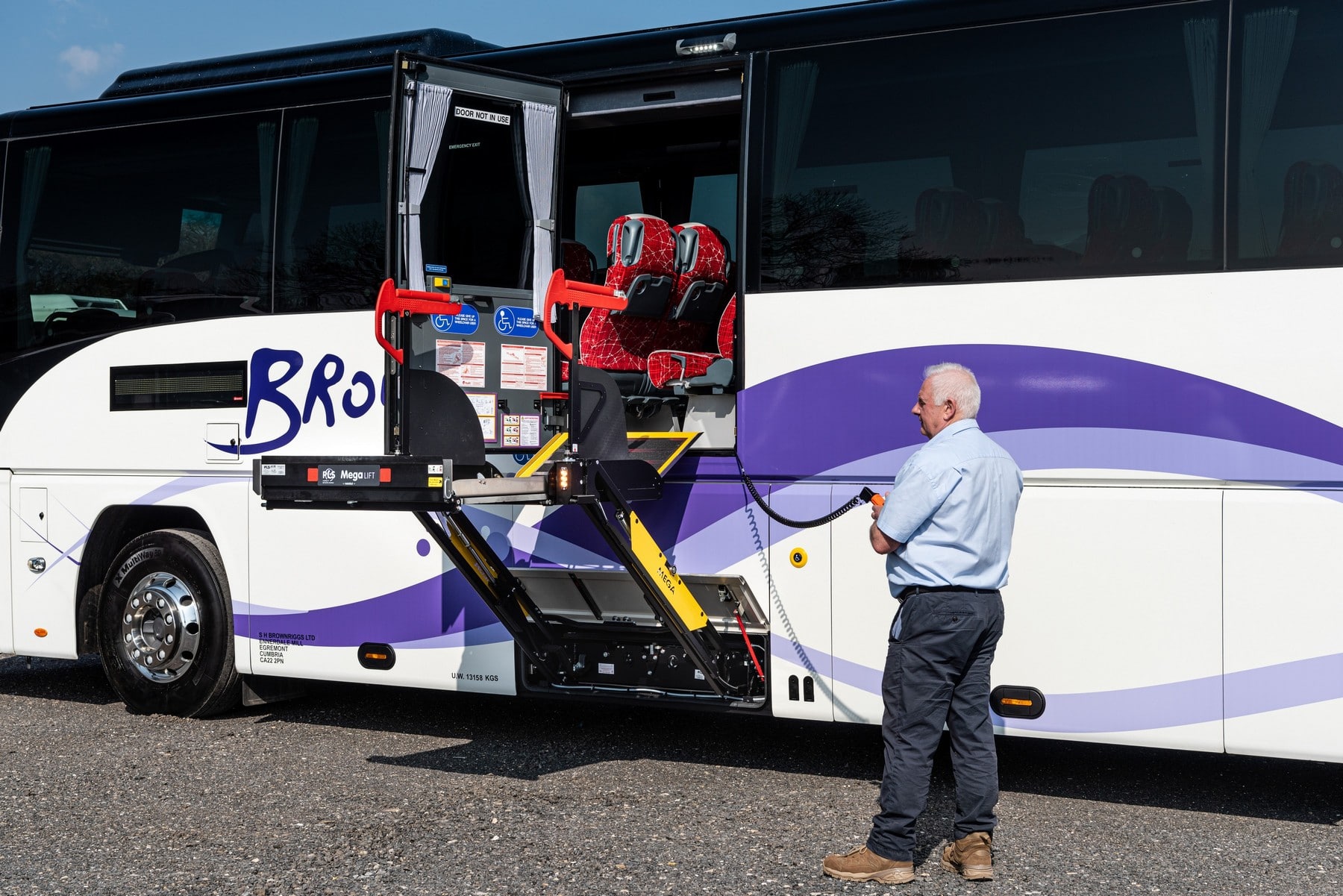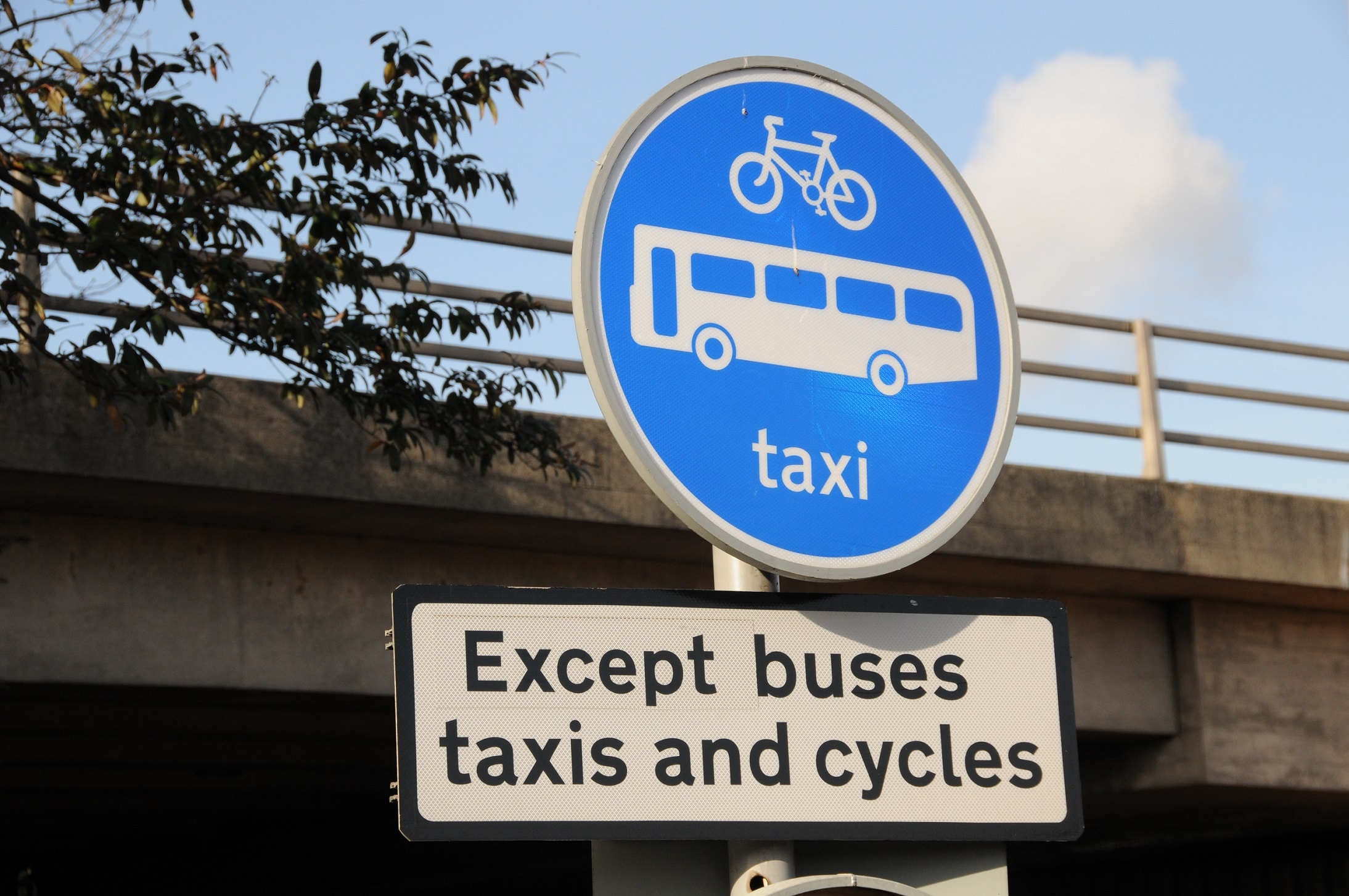The government has announced the schedule of the next set of PSVAR exemptions. But instead of levelling out the PSVAR landscape, the move is causing division.
On 6 July 2021, Baroness Vere, Minister for Roads, Buses and Places, wrote to trade body Chief Executives expressing disappointment that two decades after the original introduction of the Public Service Vehicles Accessibility Regulations 2000 (PSVAR), a lack of compliant coaches continued to prevent disabled school pupils and railway passengers from travelling on the same services as non-disabled people.
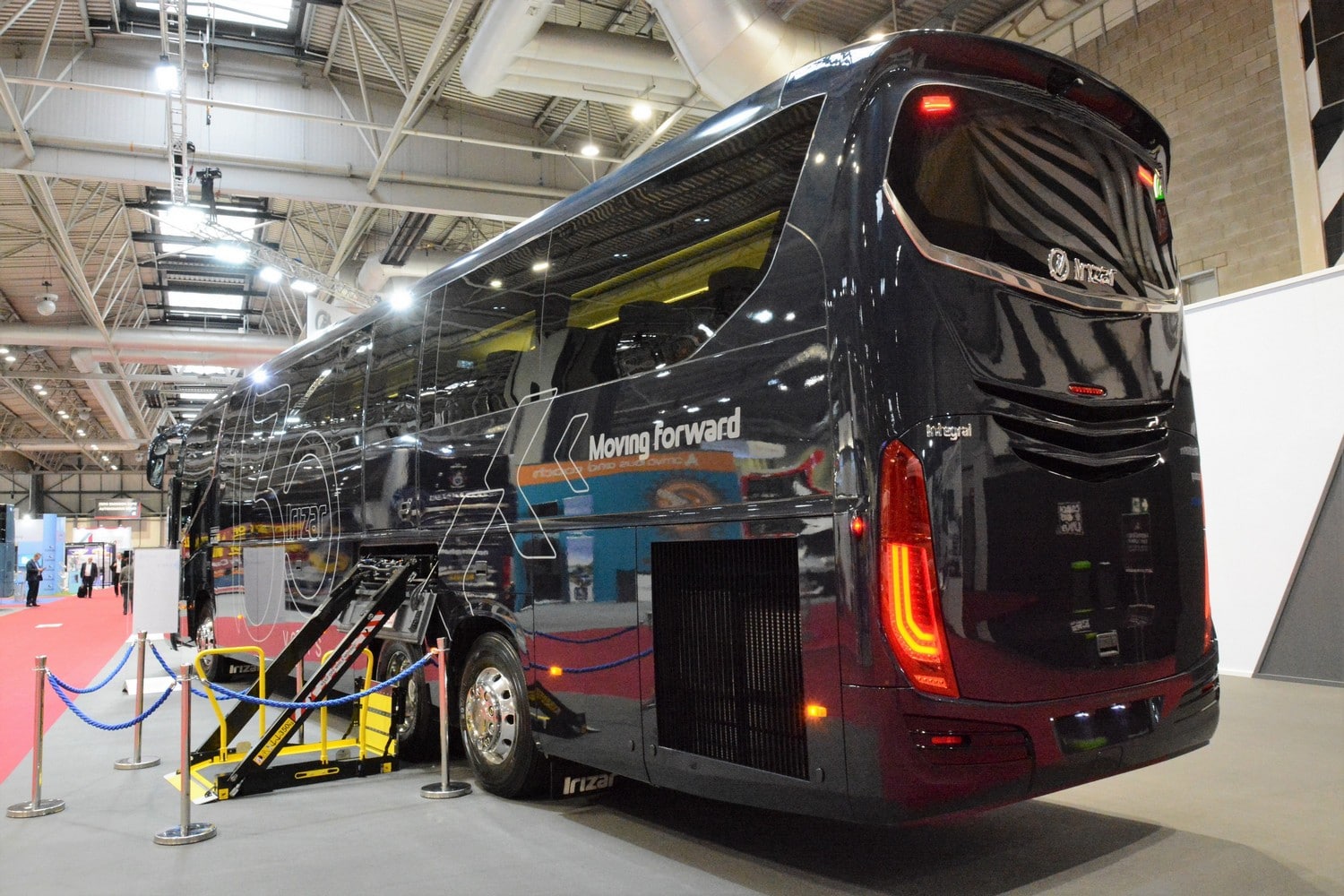
The letter indicated that DfT recognised that exemption from some PSVAR provisions couldn’t be avoided until sufficient compliant vehicles were available to meet demand. Lady Vere said that she was clear that those ‘short-term’ exemptions shouldn’t incentivise operators to stop investing in their fleets.
Continuing financial stresses in the coach industry meant that the government had to do something. That something is the promised medium-term exemptions from PSVAR for home to school (HTS) and rail replacement (RR) services. However, in once again moving the goalposts and delaying the further implementation of PSVAR, the government has generated significant criticism from those HTS operators who have already invested in making vehicles compliant.
A crazy situation
Mick Jessop, Director and Transport Manager with Huddersfield-based Coach Travel Services, which operates a fleet of seven vehicles on HTS work, is clear in his condemnation of what’s happened.
“This is a crazy situation,” he says. “On the one hand you have operators, like ourselves, who have invested heavily to ensure PSVAR compliance. Then you have operators who have waited, either purposefully, or because they haven’t had the funding available as a result of the pandemic. Whatever the reason, these operators, running non-PSVAR compliant vehicles, are able to bid for contracts at significantly lower prices than ourselves. With our local authority continuing to award work by cost, and not by compliance and quality, we’ve ended up with a two-tier industry. Put bluntly, government appears to be rewarding those who failed to comply.
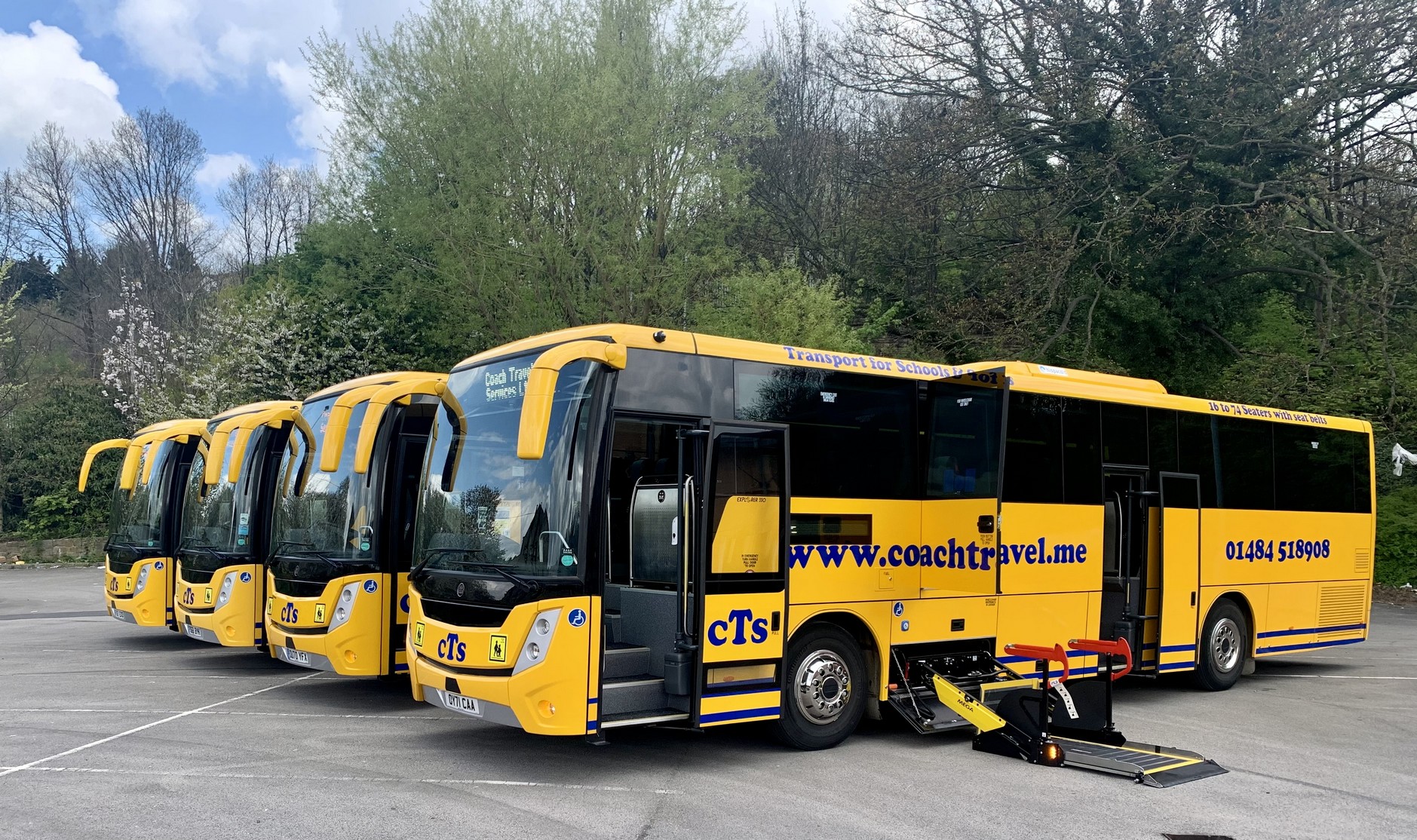
“If the government had wanted to wreck the industry, they couldn’t have done a better job. This constant uncertainty is threatening jobs, expansion and growth. I have young managers who are looking ahead and wondering what the future holds. We did the right thing. We did what government asked us to do, and then the goalposts moved. And it’s not just central government where the finger of fault can be pointed. Local authorities talk about their low-carbon policies on the one hand, then on the other they’re awarding contracts based on the lowest tender price, not on vehicle quality. Operators, like us, who have done the right thing and complied, are now worse off.”
Mick reveals a particularly galling situation where Metro issued a HTS tender.
“The tender documents, publicly available, show that three operators put in prices of around £350 per day,” he says. “A fourth operator, with an old, non-PSVAR-compliant coach, quoted just over £208!. They got the work. This isn’t just about central government, local government needs to decide what its messaging is, and stick with it.”
Tyrers Coaches, based in Farnworth, near Bolton, operates a mixed fleet of more than 120 coaches, buses and minibuses.
“All new deliveries since 2018 have been PSVAR-compliant, explains Managing Director Richard Buckle. We’ve also run a major conversion programme. We only have three non-compliant vehicles in the fleet, that how seriously we’ve taken the government’s call to comply. And now look where we find ourselves. We’ve probably spent well over half a million pounds we didn’t need to. I’m fed up with the way that this has been done. It’s absolutely farcical, and played right into the hands of those operators who placed their heads in the sand. We feel let down, for doing what we thought was right. What was the point?
“In 2019 we didn’t re-bid for some school contracts because we thought they would fall under PSVAR. A competitor took the work but we were confident we were best placed to win those contracts when the PSVAR-focused contracts came out for tender. But there was no change to the contracts and that same competitor continues to run the journeys today, and still with vehicles that aren’t PSVAR-compliant.
“We carry 6,000 schoolchildren a day in our fleet of PSVAR-compliant vehicles. We don’t carry a single wheelchair user. The new exemptions will help many operators, but who’s going to check that what operators say they’re going to do, actually happens. One of our competitors has recently bought two brand new coaches, non PSVAR-compliant. Those operators, like ourselves, who have done what we thought was right, now have to take a coach off the road every six months to have the lifts checked. It’s not a huge inconvenience, especially as it ensures safety, but it’s another expense and operational element that we face, and some of our competitors don’t. Along with many operators, we set off down the PSVAR route assuming the government would be supporting what we were doing. I can understand that the PSVAR route has been rocky, but the whole situation really does annoy me.”
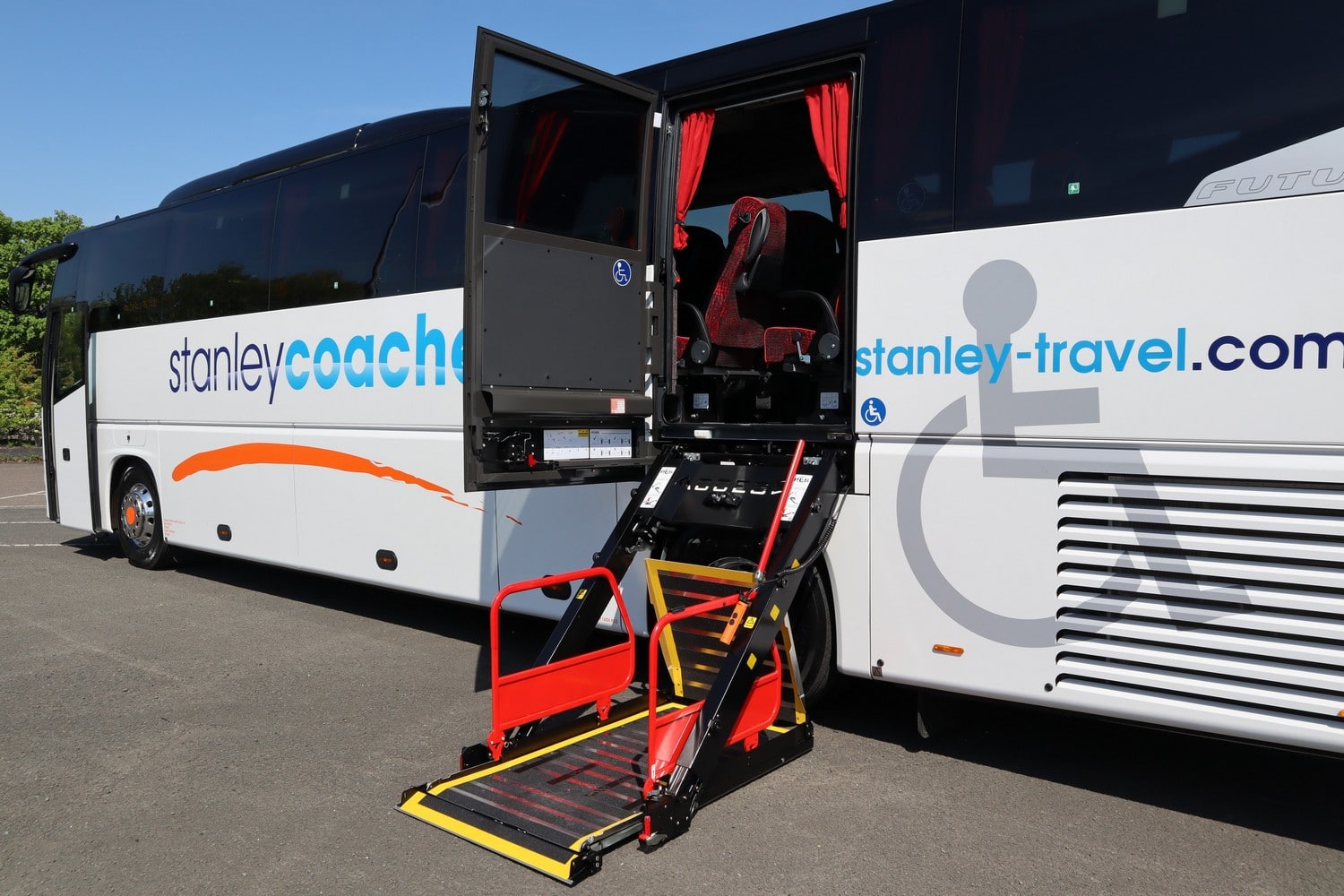
Operating nightmare
In Leicester, Confidence Bus & Coach Hire, which has been operating since 1970, finds itself facing its own challenges.
“It’s been a nightmare, but we should have seen it coming,” says owner Ken Williams. “20 years ago the original PSVAR regulations didn’t include local authority contracts. We didn’t pick up on that; we didn’t see it coming. We run 22 vehicles at the moment, mostly older buses. Much of our HTS work is with local academies. We don’t have expensive coaches, but we’ve gone a year-and-a-half now with limited work. We’re not recovered after the pandemic, so money remains tight. Coming out of the pandemic has been damaging. I’m pleased with the exemptions. It gives us a little more time to consider what we do. In the past we’ve bought two-door deckers from London. They’re excellent vehicles for schools work, and are already PSVAR-compliant. But our schools only want a single door. So we converted the buses. That means that now they’re no longer PSVAR-compliant!
“We’re finding that, like most HTS operators, schools and academies were initially keen to see the quality of the vehicles they were contracting. We sent out fleet lists. But after that initial interest, nothing. It still seems to be first and foremost about cost. I can understand an operator having a number of PSVAR-compliant coaches in the yard, and it’s good to see the schedule for the medium-term exemptions going down the percentage route. But what happens then? Slowing the pace down is helping; it’s giving us time to think. But I’m not going to fight the regulations. We’ve been operating since 1970 and I’m planning to plod on as best I can. But with congestion charging, low emission zones, driver shortages, and now this, I do wonder what will happen.
“For us, the answer is simple. If we can’t meet the regulations because of the nature of what we do then we might come out of the HTS market. We’re going to do our best but we’re not going to invest massive money because for us, it’s simply not worth it. We’ve carried passengers for 52 years. Perhaps the time is approaching when it’s time to be a passenger ourselves!”
Reasonable balance
Commenting on the new medium-term exemptions, Tom Bartošák-Harlow, Head of External Relations with the Confederation of Passenger Transport (CPT), says: “This exemption provides welcome clarity for the next four years enabling operators to plan, and strikes a reasonable balance between operators that have invested to comply and improve accessibility and those who have struggled to do so due to the impact of Covid-19. Throughout the development of this exemption CPT had discussions with DfT to help and while not all aspects of the exemptions are ideal, CPT was able to mitigate unintended consequences for operators. CPT will continue to engage with DfT on the longer term review of PSVAR.”
Lady Vere’s letter of 6 July includes the following sentence: “Local authorities, schools and colleges must also take responsibility for procuring inclusive services.”
Andy Warrender, Operations Manager – Coaches at RHA, notes that this was seen by many as an indication that these organisations would prioritise those operators who have upgraded their fleets.
“But it seems those organisations haven’t and aren’t going to go with what the letter appeared to promise,” he says. “Many operators are clearly disappointed in this. The medium-term exemptions apply commonsense to the PSVAR issue, but still don’t prioritise those vehicles that are available. The forthcoming review of the next stages of PSVAR implementation, part of the objectives of the National Bus Strategy for England (‘Bus Back Better’) may mean more day-to-day operations are brought into scope of PSVAR. We will have to wait and see. The last two years should have given operators a better understanding of their true costs of operation. That will have helped them recalibrate what they do. I would expect operators to be in a better position to analyse costs – giving them a much better idea of where they need to be.”
Empathy with operators
Peter Bradley, Managing Director of the UK Coach Operators Association (UKCOA) understands the anger coming from many operators.
“I have empathy with those operators that have invested in making their vehicles PSVAR-compliant,” he says. “However, my understanding is that if it hadn’t have been for the pandemic, government wouldn’t have been so lenient. In the discussions that I had with DfT, together with our other industry trade bodies, it was clearly recognised that some operators had already gone compliant. We recognised that those operators would be deeply unhappy if after investing, sometimes heavily, because it was the right thing to do, other operators who had chosen not to go down that route, for whatever reason, should be able to compete in the same local authority arena for HTS work.
“We suggested that HTS contracts that were already being operated by PSVAR-compliant vehicles shouldn’t be allowed to be given to operators wanting to use non-PSVAR-compliant vehicles. Sadly, that suggestion wasn’t taken forward, and I can understand the unhappiness now coming from operators affected in this way. I wish there could have been something done to recognise those operators that had invested.”
A road map to work with
Continues Peter: “Across our own members we have many who have just a few, or in some cases, no PSVAR compliant vehicles. These are operators who operate rural HTS transport and they’re concerned about deploying the lifts where there’s no kerb. I understand that risk assessments flag up this specific situation. This issue has been fed back to DfT to form part of the next PSVAR review that’s due to be completed by the end of 2023. This is the same review that will guide the next stages of PSVAR compliance once the medium-term exemptions schedule ends on 31 July 2026.
“It seems likely that the review will set out the government’s plans for all new coaches. Most new coaches are already compliant, with the exception of a lift and destination equipment. If the review concludes that every new coach must be built to conform to the full set of PSVAR2000 regulations then the likely two-and-a-half period between the review being published and the end of the medium-term exemptions will give manufacturers a window in which to revisit their designs.
“If DfT hadn’t introduced the short-term extensions and insisted on PSVAR compliant vehicles for HTS, it’s likely that HTS would have collapsed. The short-term exemptions were there very much as a stop-gap whilst the medium-term was planned. My view of all of this is that we (the industry) have been thrown a lifeline by the government. We need to work with this. Our membership has recognised this is a compromise. We need the government on side as we move forward with the discussion about zero emissions. We know zero emission touring coaches are some considerable way off due to batteries taking up luggage space. But ideas are starting to emerge. This time we need to be at the table from the start, and not find ourselves being given a set of regulations that may or not work.
“However, this is where we are, and we know where we need to be. We have a road map, even if the route to the final destination is still obscured. We’ve been given some concessions and in general I’m happy with the exemptions schedule. Having said that, I do recognise that it remains a challenge for larger operators to meet the 35% target over the next four years.”
But as Mick Jessop of Coach Travel Services says: “The constant mind changing is making the situation worse. We could find government dropping PSVAR for HTS work entirely. What we need is for the rules and a clear timescale to be set, and then we can follow them. It does seem that finding a way to get local authorities to focus on operators with PSVAR compliant vehicles for HTS contracts would also be a step in the right direction. In the meantime, the compliance schedule is simply kicking the can down the road.”
Full details of medium-term exemptions at go.route-one/1702




















